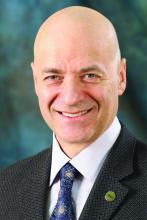Dermatology practices that are resuming in-person services amid the ongoing pandemic face a range of questions and concerns when it comes to restarting patient visits.
To address these questions and considerations, the . Among the subjects covered are how practices can properly prepare clinic space to ensure staff and patients are safe and how to organize and educate employees on social distancing and safety protocols.
“All along, [we have] had guidance to help practices continue taking care of patients for essential services,” George J. Hruza, MD, immediate past president of the AAD, said in an interview. “This is really an extension of those as some states are opening up and relaxing some of the restrictions on elective procedures. We wanted to help our practices that are going to be reopening or going back to more regular services so they have a bit of a road map.”
The first step to reopening and resuming services is understanding your community’s COVID-19 prevalence and keeping updated on transmission information from local and state authorities, according to the AAD guidance. Keep in mind the federal government has specified that there should be a downward trajectory of documented cases over a 14-day period before opening practices to elective visits and procedures.
Preparing the practice through sanitation and reorganizing to minimize patient contact is also essential when reopening or resuming services. This includes cleaning and disinfecting based on World Health Organization standards, adding markings where necessary to maintain appropriate social distance, and supplying additional hand sanitizers and wipes for patients and staff, according to the guidance.
A top challenge as practices reopen is making patients feel comfortable with coming back to the practice for in-person care, said Dr. Hruza, who practices in St. Louis and is president of the Missouri State Medical Association. The AAD’s road map recommends informing patients about the reopening or reexpansion of elective procedures and communicating the steps the practice is taking to prevent COVID-19 infections and keep patients safe. It may be necessary to start with fewer patients than normal to adjust to the new safety steps until it becomes routine, according to the guidance.
Educating staff on social distancing and personal protective equipment (PPE) also is key. Staff should wear PPE for office staff meetings or sit at least 6 feet apart, according to the AAD guidelines. Practices also must determine what procedures may require additional PPE.
“If you’re doing some laser procedures, there may be a little more of a problem with tissue getting into the air or in the environment, so you may need to increase your protections a bit more,” Dr. Hruza said. “That may be a setting where you want to wear a N95 [mask].”
The AAD advises that practices be prepared to take necessary steps if a resurgence of COVID-19 cases in their community or clinic arises after reopening. Follow recommendations as they develop, be flexible, and be prepared to respond and reschedule patients, if necessary, Dr. Hruza said.


